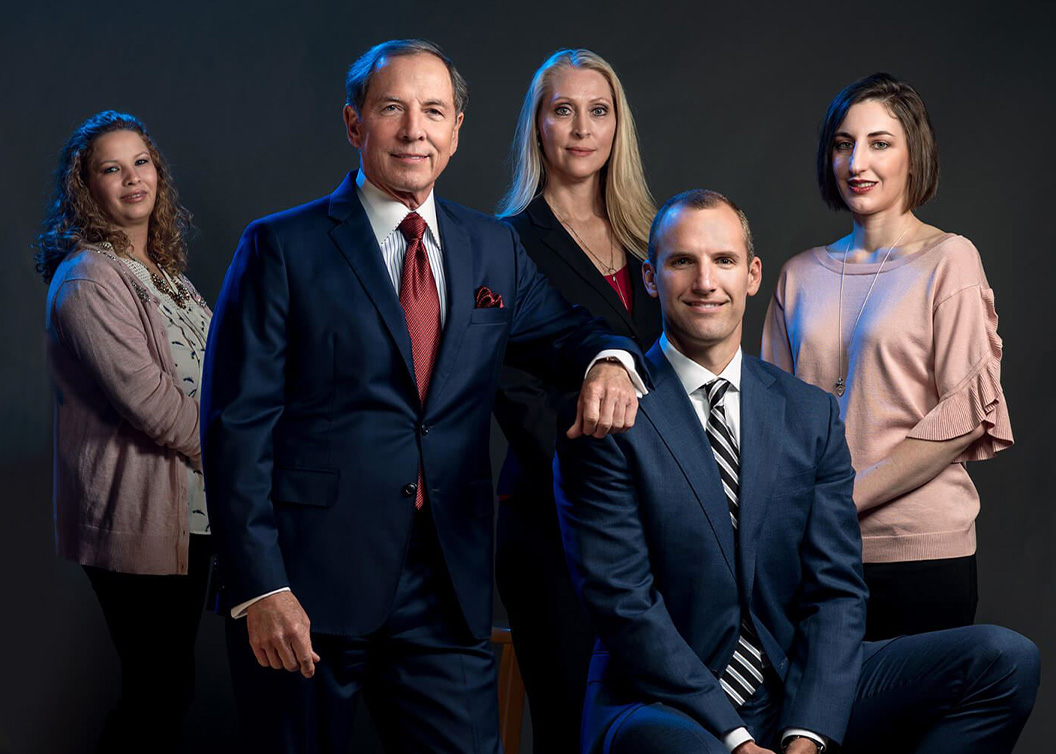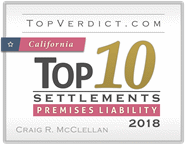
Government & Municipal Liability Claims in California
Can a Public Agency Be Held at Fault for Injuries?
Government agencies, employees, and contractors are not immune from creating unsafe conditions on the systems or property for which they’re responsible. When victims suffer harm as a result, there are laws in place to protect their rights – including laws that let them sue the government.
However, those laws create rules and procedures unique to government liability, and provide special protections to public entities that makes it harder to hold them accountable.
With the pathway to justice in government and municipal liability cases obscured by legal hurdles, victims, families, and law firms with difficult claims can feel confident about placing their trust in our proven team at The McClellan Law Firm.
The McClellan Law Firm has recovered millions from City, County, and State entities on behalf of injured victims and families; and are available to discuss your potential case. Call (619) 215-1488 for a free consultation.
Liability Claims Against Public Entities
A government or municipal liability claim refers to a legal action brought against a government entity or municipality (such as a city, county, or state government) for damages or injuries caused by the actions or negligence of the government entity, its employees, or its agents. These claims can arise from a wide range of situations where the government entity is alleged to have caused harm or injury to individuals or property.
Some common types of government liability claims include:
- Negligence: Government entities, like any other party, can be held liable for negligence if they fail to exercise reasonable care and their actions or inactions result in harm. This can include situations such as slip and fall accidents on government property due to inadequate maintenance, traffic accidents involving government vehicles, or injuries caused by negligent supervision in government-run facilities like parks or schools.
- Dangerous Conditions of Public Property: Government entities have a duty to maintain public property in a reasonably safe condition. Claims may arise when dangerous conditions on public property, such as potholes on roads, malfunctioning traffic signals, or inadequate warning signs, lead to accidents or injuries.
- Medical Malpractice: Claims against government entities can also arise from medical malpractice in government-run healthcare facilities, such as public hospitals or clinics. These claims may involve allegations of negligence by medical staff, failure to diagnose or treat medical conditions properly, or errors in medication administration.
- Unsafe Premises: Government-owned or operated buildings, facilities, and parks must be maintained in a safe condition for visitors and occupants. Claims may arise from injuries caused by unsafe conditions on government premises, such as broken stairs, faulty equipment, or hazardous materials.
- Vehicle Accidents: Accidents involving government-owned vehicles, such as police cars, fire trucks, or public transportation vehicles, can lead to liability claims against the government entity. These claims may involve allegations of negligent driving, failure to maintain vehicles properly, or inadequate training of government employees.
Government and municipality claims present many complexities for victims seeking justice. Public entities are keen to avoid paying claims for damages, and leverage laws – including key legislation such as the California Tort Claims Act and the Federal Tort Claims Act – which exist precisely to limit the liability of the government and its agents.
These laws make it exceedingly difficult to hold public entities liable for damages, and often include protections and procedures which do not favor plaintiffs – such as government immunity, a shortened statute of limitations, and strict deadlines for reporting notices of claims.
Overcoming these obstacles demands the attention of experienced, detail-oriented trial attorneys who understand the nuances of public entity tort liability – and who have the resources and proven record of success to help plaintiffs and plaintiffs’ attorneys prevail in their fight for justice.
Some of Our Government Liability Case Results:
- $2.5 Million Against the State of Louisiana
- Cooley v. The State of Louisiana: A deceptive turn on a rural road with no shoulder or recovery area caused a vehicle to depart from the roadway and roll into a field.
- $2.3 Million Against the City of Vista
- Sherman v. City of Vista: A 19-year-old City of Vista employee was struck by a drunk driver while loading equipment into a truck. The McClellan Law Firm argued the City failed to properly supervise, and created an unsafe condition of public property.
- $2.25 Million Against the State of California
- Henline v. State of California: Freeway construction barriers eliminated any recovery area after the plaintiffs’ vehicle was cut off by truck.
- $1.9 Million Against the State of California
- John Doe v. State of California: The McClellan Law Firm argued the State failed to maintain and trim oleanders in the center median of I-5 South, creating a “ramp” which launched the plaintiffs’ vehicle and caused catastrophic injuries, when the proper role of median barriers is to safely redirect out-of-control. Ford Motor Co. also agreed to a confidential settlement in the case.
- $1.25 Million Against the State of California
- Banks v. State of California: Plaintiff was seriously injured after his car swerved off the freeway and rolled over. The McClellan Law Firm argued the freeway should have had a guardrail to prevent vehicles from dropping off the elevated roadway.
- $1.2 Million Against the City of Lemon Grove
- Reveles v. City of Lemon Grove, et. al.: A 17 year-old boy was left with a severe head injury following a collision at a dangerously designed intersection.
- $1 Million Against the County of San Diego
- McAllister v. County of San Diego: Two high school students were tragically killed when their car slid off wet roadway surface into a tree that was too close to the road.
- Confidential Recovery Against the City of Poway
- Roberts v. The City of Poway: Trash containers placed in the bike line at the instruction of the City and its contractor, a disposal company, knocked a bicycle rider into traffic lanes, where he was fatally struck.
California Tort Claims Act
Just as victims have the right to file claims against a private party who caused damages due to negligent or wrongful acts, so too do victims of negligent and wrongful acts committed by public entities. Though the concept behind both types of claims are the same – seeking compensation for civil “wrongs” and legitimate losses – the rules and procedure which govern them are distinctly different.
Public entity liability claims have a lot to do with “sovereign immunity,” a concept which dates back centuries and once prevented citizens from suing states or the federal government. Today, sovereign immunity has been eliminated, at least in part, by most jurisdictions – including the state of California, which passed the California Tort Claims Act (CTCA) in 1963 and the Federal Government, which passed the Federal Tort Claims Act (FTCA) in 1946.
In California, the CA Tort Claims Act – also known as the “Government Claims Act” – sets rules and procedures for all claims against the State of California, as well as local governments, municipalities, and political subdivisions. Notably, it’s rooted in sovereign immunity:
"Except as otherwise provided by statute; a public entity is not liable for an injury, whether such injury arises out of an act or omission of the public entity or a public employee or any other person.” (Government Code § 810-996.6)
Although the Act claims sovereign immunity, it does create statutory exceptions for private citizens to sue the State and other public entities for injuries and damages. For those limited exceptions, there also exist a number of strict claim procedures which victims must follow in order to recover damages. In the early stages of a government liability case, this includes requirements to:
- File a Notice of Claim: Before a government entity can be sued, victims must provide the government with notice of his or her claim. Some municipalities and government agencies provide forms online that can be printed and mailed, or submitted electronically. A timely and properly completed notice is essential to government liability cases; missing information, late submission, using the wrong form of communication, or filing notice with the wrong entity could result in delays or rejection of the claim.
- Include Required Information in Claim: Per Gov. Code § 910 - 913.2, a notice of claim must contain: (1) claimant’s name and address; (2) address where response is to be sent; (3) date, place, and facts of incident giving rise to the claim; (4) general description of damages incurred at the time of the notice; (5) name of agency, entity, and / or employee which caused the injury (if known); and (6) amount of damages (if under $10k) or notice of limited civil case (any case which seeks damages under $25k). For the injured victims we represent, this last step is not necessary, as the costs of medical bills, lost income, and other damages far exceed the $25k threshold.
- Adhere to Time Limits: In addition to meeting the above requirements, anyone with a potential injury case against a government entity must meet strict deadlines for filing their notice of claim (and if and when applicable, a subsequent lawsuit). In California, the notice of claim against a government entity must be filed within 6 months of the date of injury or death (Cal. Gov’t Code § 911.2.) In some cases, notices may be required within 6 months from the date a victim “discovers” their injury. Late notice of claims (with a request for permission to file a late claim) may be permitted under very strict circumstances, including claimant death, the claimant being a minor during the six-month window, mental or physical incapacity, or some justifiable neglect.
Government liability claims are notoriously difficult, fact-specific, and highly time-sensitive. Call (619) 215-1488 to discuss your potential case with The McClellan Law Firm.
FAQ: Government Liability Cases in California
What Types of Personal Injury Claims Can I Bring Against Public Entities in California?
Victims may need to sue the government or public entities for a number of reasons. In California, most civil personal injury claims against public entities are permissible under the CTCA (provided procedural requirements are met). These include cases involving:
- Auto accidents & truck accidents
- Roadway defects / negligent road design / unsafe road conditions
- Failures to perform mandatory duty (i.e. failure to maintain City property)
- improper traffic control (especially in construction zones)
- Public transportation accidents
- Premises liability (dangerous conditions of public property)
- Medical malpractice
- Claims against public schools and school districts (injuries, sexual abuse, etc.)
- Claims against law enforcement (Excessive force, police shootings, etc.)
- Intentional torts (assault / battery)
Apart from claims of nuisance and breach of contract, the California Tort Claims Act does not allow nearly any other claim against the government. This includes special “immunities” explicitly covered by statute, including claims for injuries caused by failures to pass or enforce laws, failures to inspect property the government does not own, and discretionary acts or omissions.
California Tort Claims Act Defendants: Who Can Be Held Liable For My Injuries?
The specific facts of your case will determine who can be named as defendants. Generally, a government entity in California can be held liable for injuries “it” causes – for a dangerous condition on public property or a failure to perform duties imposed by law – or for injuries caused by the negligent acts of its employees and contractors.
The entity named as a defendant will typically be the one responsible for the property with a dangerous condition, failure to perform, or the employee / contractor. Here are a few examples of situations where public entities may be named as defendants:
- The State of California for failing to address a dangerous condition on a highway;
- A City responsible for a dangerous condition at a local park, auto accidents involving a government vehicle or employee, or a defectively designed roadway or intersection;
- A County responsible for an agency or contractor performing construction or maintenance work, or for failing to maintain trees and other county property;
- A Public Transportation System responsible for a public bus, light rail / trolley, rapid transit / subway, service station, or taxi service involved in an accident (i.e. San Diego MTS, LA Metro);
- Local or State Governments which own property or facilities that cause injury due to toxic exposure;
- A Local School or School District responsible for students at public schools.
Can I Sue the Government When Its Employee Caused My Injury?
If your injuries were caused by a person who works for the government, whether you can file a claim against the responsible public entity will depend on the circumstances involved – particularly in terms of what the person was doing at the time of the accident.
Under the CA Tort Claims Act, a government entity can be held liable for injuries caused by its employees when the employee is:
- Acting within the course and scope of their employment; or
- Carrying out a government / public agency function.
If the person who caused your accident was a government employee, but was not working or carrying out some type of government function at the time, you will likely need to pursue a claim against them as a private person, rather than a government employee.
Who Can I Sue When A Contractor Caused My Injury?
Cities, Counties, and States all rely on independent contractors to provide necessary services, as well as vendors that provide certain goods and products. Should the actions of a government contractor cause injury, the government may be held liable if the contractor was:
- Acting within the course and scope of its contracted duties / assignment; or
- Carrying out a government / agency function for which it had authority.
Tort cases involving government contractors follow the same rules as those against government employees. If the CTCA applies, it generally will not permit claims solely against the contractor / employee.
Can I Sue When My Injury Was Caused By A Dangerous Condition On Government Property?
Under premises liability laws, victims can file claims against property owners who fail to address injury-causing hazards they knew or should have known about. Premises accidents involving government liability, however, operate on a different standard.
To prevail in a premises claim against the government, a victim must prove:
- A dangerous condition existed on the property at the time of injury;
- The dangerous condition was the cause of injury;
- The dangerous condition created a reasonably foreseeable risk of injury (of the type the victim suffered);
- The dangerous condition either: (a) was created a public employee’s negligent or wrongful act; or (b) the government had notice of the dangerous condition, and enough time to correct or protect against it.
Your ability to file suit against a government entity responsible for property, facility, or land which had a dangerous condition depends on the facts involved. Dangerous condition / public property cases may involve slip / trip and fall accidents, unsafe road conditions which contribute to accidents, and explosions or toxic exposure, among other circumstances.
How Does A California Tort Claims Act Case Work?
By requiring victims to submit a notice of claim, California Tort Claims Act cases offer the government an opportunity to investigate the allegations, incident, and / or dangerous condition, limit its scope of liability for litigation and damages, and offer a remedy for losses suffered by claimants with meritorious claims without the need for trial. As a practical matter, however, tort claims are rarely resolved short of litigation.
Generally, after submission of a properly completed notice of claim to the appropriate public entity, the government has 45 days to respond. This may result in one of several actions:
- The claim is rejected, or there is no response (which effectively means it is rejected);
- The claim is approved in whole for requested damages, or in part by way of a settlement;
- The entity requests additional information / that the claimant amend the claim within a certain time period;
- The claim is returned for being untimely.
If a claim is denied or rejected, either in part or in whole, claimants can proceed by filing a civil lawsuit against the government. There are two statutes of limitations for filing an actual lawsuit against a government entity:
- 6 months from the date a claimant receives notice from the government that the claim is rejected in part or in whole; or
- 2 years from the date of the incident if the government failed to respond to the notice of claim.
Because California does NOT have damages caps in government liability cases, victims are entitled to recover their economic and non-economic damages just as they would in a normal personal injury case against a private party – meaning they can recover for medical expenses, lost income, pain and suffering, and other damages.
However, the Act does not allow for the recovery of punitive damages, which are awarded in very few civil injury cases, and only when egregious conduct can be shown.
Call Our Public Entity Liability Attorneys in CA
Over the years, The McClellan Law Firm has prevailed in many government liability claims against City, County, and State governments, as well as various government agencies and contractors. If you have questions about a potential serious injury or wrongful death case involving a government entity, call (619) 215-1488 for a free consultation.
For over 30 years, The McClellan Law Firm has been dedicated to helping clients across California secure justice and protect their futures. Founded by renowned attorney Craig R. McClellan, the firm has earned a reputation for excellence and integrity in the legal field. With decades of experience and a commitment to achieving results, we pride ourselves on providing exceptional representation and unwavering support to every client we serve.



-
 Craig McClellan is a member of the Inner Circle of Advocates, an invitation-only group of the top 100 plaintiff trial lawyers in the United States.
Craig McClellan is a member of the Inner Circle of Advocates, an invitation-only group of the top 100 plaintiff trial lawyers in the United States. -
 Craig McClellan was voted Lawyer of the Year for Product Liability Litigation by Best Lawyers for 2025.
Craig McClellan was voted Lawyer of the Year for Product Liability Litigation by Best Lawyers for 2025. -
 The firm earned a Tier 1 ranking in Personal Injury in the 2025 list of the Best Law Firms.
The firm earned a Tier 1 ranking in Personal Injury in the 2025 list of the Best Law Firms. -
 Craig McClellan earned one of the top 10 medical malpractice settlements in California, securing a $9,000,000 settlement for a client.
Craig McClellan earned one of the top 10 medical malpractice settlements in California, securing a $9,000,000 settlement for a client. -
 Craig McClellan & Conor Hulburt earned one of the top 10 premises liability settlements in California, securing a $3,175,850 settlement for a client.
Craig McClellan & Conor Hulburt earned one of the top 10 premises liability settlements in California, securing a $3,175,850 settlement for a client. -
 Craig McClellan has been selected to the list of Super Lawyers every year since 2007, and earned the most votes of ANY lawyer for 2019 in San Diego.
Craig McClellan has been selected to the list of Super Lawyers every year since 2007, and earned the most votes of ANY lawyer for 2019 in San Diego. -
 Craig McClellan was voted Lawyer of the Year for Product Liability Litigation by Best Lawyers for 2019.
Craig McClellan was voted Lawyer of the Year for Product Liability Litigation by Best Lawyers for 2019. -
 Craig McClellan is listed as one of America’s Top 100 High Stakes Litigators in Business Litigation, Personal Injury, and Product Liability.
Craig McClellan is listed as one of America’s Top 100 High Stakes Litigators in Business Litigation, Personal Injury, and Product Liability. -
 Attorney McClellan has a 10/10 “Superb” rating, the highest rating an attorney can receive from Avvo.
Attorney McClellan has a 10/10 “Superb” rating, the highest rating an attorney can receive from Avvo. -
 The firm has an A+ rating from the Better Business Bureau, the highest possible rating offered by the organization.
The firm has an A+ rating from the Better Business Bureau, the highest possible rating offered by the organization. -
 Attorney McClellan is a member of the Consumer Attorneys of San Diego, and previously served on its Board of Directors.
Attorney McClellan is a member of the Consumer Attorneys of San Diego, and previously served on its Board of Directors. -
 Attorney Craig McClellan was named as one of the “Best Attorneys” by the Los Angeles Times.
Attorney Craig McClellan was named as one of the “Best Attorneys” by the Los Angeles Times. -
 Attorney Craig McClellan was named one of the “Best Lawyers” by San Diego Metro.
Attorney Craig McClellan was named one of the “Best Lawyers” by San Diego Metro. -
 Attorney Craig McClellan was named one of the Top Lawyers in San Diego in Business Litigation by San Diego Magazine.
Attorney Craig McClellan was named one of the Top Lawyers in San Diego in Business Litigation by San Diego Magazine. -
 Craig McClellan has been named among the Lawdragon 500 Leading Plaintiff Consumer Lawyers, which honors the nation’s top advocates.
Craig McClellan has been named among the Lawdragon 500 Leading Plaintiff Consumer Lawyers, which honors the nation’s top advocates.

-
“I swear they work 24/7! And most importantly, we knew that they truly cared about us and the outcome. They fought for our family and have given us the piece of mind that our son's healthcare will always be covered.”S.P.
-
“We will NEVER forget what you did for us Craig. We are FOREVER GRATEFUL.”K.V.
-
“We wouldn’t be here, in this moment of life without the kindness and professionalism of you all and how you went to bat for us! Eternally grateful!”A.K.


.2412171328362.png)
.2411141136156.png)



.2411141143453.png)






.2411141148140.png)